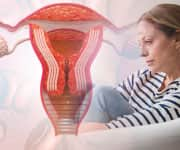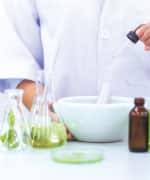Life Extension Magazine®
Hot flashes are one of the dreaded miseries women experience as they go through menopause.1
These “heat waves” are one of 11 common menopausal symptoms.
Sleep difficulties, mood swings and irritability, and vaginal dryness are also prevalent problems.2
For women who prefer to avoid hormone treatments, there’s another solution.
A standardized Siberian rhubarb is used in Europe as an alternative. It has been shown to improve all 11 common menopausal symptoms.
Human studies show that this Siberian rhubarb extract can reduce overall symptom severity up to 83%.3
The 11 Common Symptoms of Menopause

Menopause is marked by 12 consecutive months without a menstrual period. It generally occurs at around age 51, though symptoms can start several years earlier, during perimenopause.4
As estrogen and progesterone levels decline during the menopausal transition, women can be affected physically and psychologically.2
A frequently used tool to assess menopause symptoms is the Menopause Rating Scale.5
It includes 11 common concerns:5
- Hot flashes/excessive sweating,
- Heart discomfort,
- Sleep problems,
- Joint/muscle discomfort,
- Depressive mood,
- Irritability,
- Anxiety,
- Physical/mental exhaustion,
- Sexual problems,
- Bladder issues, and
- Vaginal dryness.
There is a non-hormonal way to address all of these menopausal symptoms.6
A European Solution
Most of the symptoms of menopause are caused by a drop in levels of the hormone estrogen.
Estrogen binds to receptor sites on cell membranes to activate beneficial and sometimes detrimental cellular processes, including excess proliferation.
Activating the ER-beta receptor promotes beneficial effects on skin, brain, bone, cardiovascular, and other tissues. This can support menopausal symptom relief.
Activating the ER-alpha receptor, on the other hand, can produce undesirable growth in some tissues, including initiating and promoting cancer.
Increased activity of the ER-alpha receptor is believed to cause many of the ill effects of conventional hormone-replacement therapy for menopausal symptoms.9
For nearly three decades, German practitioners have been recommending a standardized extract from the roots of the Siberian rhubarb plant to safely treat these symptoms.7
In preclinical studies, these plant compounds have shown greater affinity for the beneficial estrogen receptor-beta (ER-beta) than for potentially detrimental estrogen receptor-alpha (ER-alpha).8
Siberian rhubarb extract didn’t activate ER-alpha.8
The ability of Siberian rhubarb extract to selectively activate ER-beta but not ER-alpha is a key reason for its safety.10
Proven in Human Studies

In a double-blind clinical trial, 109 symptomatic perimenopausal women took 4 mg of Siberian rhubarb extract or a placebo daily for three months.
Within one month, the Siberian rhubarb extract group had a significant reduction in the number and severity of hot flashes.
By nearly three months, they had a 54% overall improvement in the severity of menopause symptoms, based on the Menopause Rating Scale.11
These results were confirmed in a similarly designed clinical trial of 112 perimenopausal women, which produced similar results, including an 83% reduction in the median number and severity of daily hot flashes.12
After completing the first trial, the scientists continued to follow the women taking Siberian rhubarb extract for up to two years.3
The women had a remarkable 83% reduction in the severity of menopause symptoms within the first year. This improvement was maintained during the second year of follow-up.3
What you need to know
Natural and Effective Menopause Relief
- Menopause is marked by 11 common symptoms, including hot flashes, sleep difficulty, joint and muscle pain, mood disturbances, sexual problems, bladder issues, vaginal dryness, and more.
- Multiple human studies show that Siberian rhubarb root extract provides relief from all 11 symptoms on the Menopause Rating Scale and reduces overall symptom severity by up to 83%.
- Siberian rhubarb extract has been widely used in Germany for decades and has an excellent safety profile, based on extensive clinical, preclinical, and lab studies.
In an open-label observational study, 252 symptomatic perimenopausal or postmenopausal women also took 4 mg of Siberian rhubarb extract daily. After six months, 56% reported major improvements and 13% reported complete recovery from their symptoms.13
The largest improvements in symptom severity were for hot flashes, sleep problems, and irritability.13
In all these studies, Siberian rhubarb extract produced significant improvement in every one of the 11 symptoms on the Menopause Rating Scale.3,11-13
Ending Hot Flashes
Hot flashes and night sweats affect up to 50% of perimenopausal and up to 85% of postmenopausal women.14,15
Hot flashes typically continue for five to seven years. Some women deal with them for 15 years or more.1
When 56 perimenopausal women took 4 mg of Siberian rhubarb extract daily for three months, the median number of hot flashes dropped from 12 to just two per day. That’s an astonishing 83% reduction.12
The placebo group had a median 8% increase in the number of hot flashes.12
That means Siberian rhubarb performed better than conventional hormone replacement therapy, which decreases the frequency of hot flashes by about 75%.16
Easing Heart Discomfort
Hot flashes are more than just a nuisance. They are linked with an increased risk of atherosclerosis (the buildup of plaque in arteries) and cardiovascular disease.17,18
Hot flashes are also associated with inflammation and poor function of endothelial cells, which line blood vessels and promote proper expansion and blood flow.18
In addition, falling estrogen levels appear to be associated with the heart palpitations experienced by many during menopause.19-21
In vitro research indicates that the rhaponticin in Siberian rhubarb extract has anti-inflammatory properties. It may inhibit enzymes that produce inflammatory cytokines in endothelial cells.22
In placebo-controlled studies, Siberian rhubarb extract reduced heart complaints by as much as 60%, on average, in about three months.3,12
Improving Sleep

Sleep problems, including difficulty falling asleep or staying asleep, tend to peak around the final transition to menopause.23,24
Several menopause-related factors can contribute to sleep issues, including hormonal changes, hot flashes, and night sweats.24
Clinical studies have shown that taking Siberian rhubarb extract daily decreases the severity of sleep problems by 60%-69% in perimenopausal women.3,12
A review was done of 17 placebo-controlled trials that tested botanical products for the relief of menopause symptoms. Siberian rhubarb extract was one of the few remedies that improved sleep.14
Relief for Mood Disturbances
Shifting hormone levels during perimenopause are associated with a variety of mood disorders, including depression, irritability, and anxiety.21,25-27
In a placebo-controlled trial in 109 perimenopausal women,26 the majority initially reported feelings of depression, including being “in low spirits mostly” or “up and down in spirits a lot.”
After taking Siberian rhubarb daily for three months, 59% of the women reported being “in good spirits mostly,” and 9% reported being “in very good spirits mostly.”26
In the same study, the women taking Siberian rhubarb had a 66% decline in anxiety scores on a recognized anxiety scale.
Research suggests irritability is the main mood challenge for women during perimenopause.25
In an open-label observational study lasting six months, women who took 4 mg of Siberian rhubarb extract daily had large reductions in feelings of irritability.13
Siberian rhubarb may improve mood in several ways.
Both estrogen and progesterone have mood-improving properties. Their protective effects wane in menopause as hormone levels drop.26,27
Animal research suggests that ER-beta receptors play a role in mediating anxiety.26 Siberian rhubarb extract may help by activating the ER-beta receptors.26
In addition, decreasing hot flashes and improving sleep can help improve mood as a side benefit.24,28
No More Exhaustion
Roughly 72%-84% of menopausal women experience physical and mental exhaustion.29,30
These feelings are accompanied by a general decrease in physical and mental performance and concentration, as well as impaired memory, a decrease in concentration, and an increase in forgetfulness.20
When perimenopausal women took Siberianrhubarb extract, they had an average 57% improvement in physical and mental exhaustion after just three months.3
After taking Siberian rhubarb daily for a year, their feelings of exhaustion had improved by an average 73%. This level of improvement was maintained for a second year of follow-up.3
Siberian rhubarb may achieve these results by interacting with ER-beta receptors in the brain, which are involved in memory and cognition.31
Countering Urogenital Changes
More than 50% of postmenopausal women are affected by urogenital symptoms.32
These include:20
- Bladder problems (such as difficulty urinating, increased need to urinate, and incontinence),
- Vaginal dryness (which may lead to difficult or painful sex), and
- Sexual problems (including a change in sexual desire, activity, or satisfaction).
Perimenopausal women who took Siberian rhubarb extract daily for three months had a 50%-67% reduction in severity of urogenital, sexual, and vaginal dryness symptoms, compared to baseline.3
Reducing Joint and Muscle Discomfort
Joint pain is more common among postmenopausal women than in men of the same age.33
When a group of 427 women aged 40-59 completed the Menopause Rating Scale, joint and muscle discomfort was one of the symptoms commonly rated as “very severe.”5
The changes in reproductive hormones that accompany menopause are thought to play a role in the development of osteoarthritis, when the cartilage that cushions and protects the ends of the bones wears down.21
In placebo-controlled studies of perimenopausal women, taking 4 mg of Siberian rhubarb extract daily for three months resulted in a 46%-50% improvement in joint and muscle discomfort.3,12
Extensive Safety Data

In Germany, 6.7 million doses of Siberian rhubarb extract are sold annually. Scientists have reviewed safety data collected there over two decades and concluded the extract is safe.7
Four human studies lasting up to two years found no relevant safety concerns (such as changes in breast or endometrial tissues) when women took 4 mg of Siberian rhubarb extract daily.3,11-13
In addition, exposing both estrogen-sensitive and estrogen-insensitive breast cancer cell lines to Siberian rhubarb extract at a range of concentrations in the lab did not promote the proliferation of cancer cells.34
Toxicity research in animals found no uterus-stimulating effects or other signs of harm, even when Siberian rhubarb extract was given for three months, in a daily dose approximately 14,000 times higher than the typical human dosage equivalent.35
Siberian rhubarb extract has been shown to be a safe, effective way to treat a range of symptoms associated with menopause.
Summary
Most women approaching or going through menopause suffer from symptoms like hot flashes, sleep disturbances, and mood changes.

Siberian rhubarb extract has been shown to be a clinically effective, safe, and convenient non-hormonal option for both perimenopausal and postmenopausal women.
Multiple human studies show that 4 mg of Siberian rhubarb extract taken daily significantly improves all top 11 menopausal symptoms, including hot flashes, sleep problems, depression and irritability, heart and joint discomfort, sexual problems, and vaginal dryness.
If you have any questions on the scientific content of this article, please call a Life Extension® Wellness Specialist at 1-866-864-3027.
Not All Extracts Are the Same
Based on studies presented, women who decide on a non-hormonal approach to menopausal symptoms should consider extracts of a clinically studied form of Siberian Rhubarb standardized to more than 54% rhaponticin and more than 27% desoxyrhaponticin.
References
- Johnson A, Roberts L, Elkins G. Complementary and Alternative Medicine for Menopause. J Evid Based Integr Med. 2019 Jan-Dec;24:2515690X19829380.
- Zangger M, Poethig D, Meissner F, et al. Linking the menopause rating scale to the International classification of functioning, disability and health - A first step towards the implementation of the EMAS menopause health care model. Maturitas. 2018 Dec;118:15-9.
- Hasper I, Ventskovskiy BM, Rettenberger R, et al. Long-term efficacy and safety of the special extract ERr 731 of Rheum rhaponticum in perimenopausal women with menopausal symptoms. Menopause. 2009 Jan-Feb;16(1):117-31.
- Marlatt KL, Beyl RA, Redman LM. A qualitative assessment of health behaviors and experiences during menopause: A cross-sectional, observational study. Maturitas. 2018 Oct;116:36-42.
- Blumel JE, Arteaga E, Parra J, et al. Decision-making for the treatment of climacteric symptoms using the Menopause Rating Scale. Maturitas. 2018 May;111:15-9.
- Nonhormonal management of menopause-associated vasomotor symptoms: 2015 position statement of The North American Menopause Society. Menopause. 2015 Nov;22(11):1155-72; quiz 73-4.
- Chang JL, Montalto MB, Heger PW, et al. Rheum rhaponticum Extract (ERr 731): Postmarketing Data on Safety Surveillance and Consumer Complaints. Integr Med (Encinitas). 2016 Jun;15(3):34-9.
- Wober J, Moller F, Richter T, et al. Activation of estrogen receptor-beta by a special extract of Rheum rhaponticum (ERr 731), its aglycones and structurally related compounds. J Steroid Biochem Mol Biol. 2007 Nov-Dec;107(3-5):191-201.
- Farzaneh S, Zarghi A. Estrogen Receptor Ligands: A Review (2013-2015). Sci Pharm. 2016 Apr 13;84(3):409-27.
- Wilson M, Konda V, Heidt K, et al. Rheum rhaponticum Root Extract Improves Vasomotor Menopausal Symptoms and Estrogen-Regulated Targets in Ovariectomized Rat Model. Int J Mol Sci. 2021 Jan 21;22(3).
- Heger M, Ventskovskiy BM, Borzenko I, et al. Efficacy and safety of a special extract of Rheum rhaponticum (ERr 731) in perimenopausal women with climacteric complaints: a 12-week randomized, double-blind, placebo-controlled trial. Menopause. 2006 Sep-Oct;13(5):744-59.
- Kaszkin-Bettag M, Ventskovskiy BM, Solskyy S, et al. Confirmation of the efficacy of ERr 731 in perimenopausal women with menopausal symptoms. Altern Ther Health Med. 2009 Jan-Feb;15(1):24-34.
- Kaszkin-Bettag M, Beck S, Richardson A, et al. Efficacy of the special extract ERr 731 from rhapontic rhubarb for menopausal complaints: a 6-month open observational study. Altern Ther Health Med. 2008 Nov-Dec;14(6):32-8.
- Ismail R, Taylor-Swanson L, Thomas A, et al. Effects of herbal preparations on symptom clusters during the menopausal transition. Climacteric. 2015 Feb;18(1):11-28.
- Santoro N. Perimenopause: From Research to Practice. J Womens Health (Larchmt). 2016 Apr;25(4):332-9.
- Hayes LP, Carroll DG, Kelley KW. Use of gabapentin for the management of natural or surgical menopausal hot flashes. Ann Pharmacother. 2011 Mar;45(3):388-94.
- Stuenkel CA. Managing menopausal vasomotor symptoms in older women. Maturitas. 2021 Jan;143:36-40.
- Thurston RC, Aslanidou Vlachos HE, Derby CA, et al. Menopausal Vasomotor Symptoms and Risk of Incident Cardiovascular Disease Events in SWAN. J Am Heart Assoc. 2021 Feb 2;10(3):e017416.
- Carpenter JS, Sheng Y, Elomba CD, et al. A Systematic Review of Palpitations Prevalence by Menopausal Status. Current Obstetrics and Gynecology Reports. 2021 2021/03/01;10(1):7-13.
- Khatoon A, Husain S, Husain S, et al. An Overview of Menopausal Symptoms Using the Menopause Rating Scale in a Tertiary Care Center. J Midlife Health. 2018 Jul-Sep;9(3):150-4.
- van Dijk GM, Kavousi M, Troup J, et al. Health issues for menopausal women: the top 11 conditions have common solutions. Maturitas. 2015 Jan;80(1):24-30.
- Kolodziejczyk-Czepas J, Czepas J. Rhaponticin as an anti-inflammatory component of rhubarb: a minireview of the current state of the art and prospects for future research. Phytochemistry Reviews. 2019;18(5):1375-86.
- Al-Safi ZA, Santoro N. Menopausal hormone therapy and menopausal symptoms. Fertil Steril. 2014 Apr;101(4):905-15.
- Proserpio P, Marra S, Campana C, et al. Insomnia and menopause: a narrative review on mechanisms and treatments. Climacteric. 2020 Dec;23(6):539-49.
- Born L, Koren G, Lin E, et al. A new, female-specific irritability rating scale. J Psychiatry Neurosci. 2008 Jul;33(4):344-54.
- Kaszkin-Bettag M, Ventskovskiy BM, Kravchenko A, et al. The special extract ERr 731 of the roots of Rheum rhaponticum decreases anxiety and improves health state and general well-being in perimenopausal women. Menopause. 2007 Mar-Apr;14(2):270-83.
- Lee J, Han Y, Cho HH, et al. Sleep Disorders and Menopause. J Menopausal Med. 2019 Aug;25(2):83-7.
- Stute P, Spyropoulou A, Karageorgiou V, et al. Management of depressive symptoms in peri- and postmenopausal women: EMAS position statement. Maturitas. 2020 Jan;131:91-101.
- Chedraui P, Perez-Lopez FR, Hidalgo L, et al. Evaluation of the presence and severity of menopausal symptoms among postmenopausal women screened for the metabolic syndrome. Gynecol Endocrinol. 2014;30(12):918-24.
- Kulkarni P, Savitha Rani BB, Kumar DS, et al. Burgeoning menopausal symptoms: An urgent public health concern. J Midlife Health. 2016 Apr-Jun;7(2):83-7.
- Gava G, Orsili I, Alvisi S, et al. Cognition, Mood and Sleep in Menopausal Transition: The Role of Menopause Hormone Therapy. Medicina (Kaunas). 2019 Oct 1;55(10).
- Gandhi J, Chen A, Dagur G, et al. Genitourinary syndrome of menopause: an overview of clinical manifestations, pathophysiology, etiology, evaluation, and management. Am J Obstet Gynecol. 2016 Dec;215(6):704-11.
- Available at: https://www.arthritis-health.com/blog/why-are-women-more-prone-osteoarthritis. Accessed June 24, 2021.
- Grundemann C, Hertrampf A, Sauer B, et al. Influence of Rheum rhaponticum, Cimicifuga racemosa and Trifolium pratense extracts on breast cancer cell proliferation. Zeitschrift fur Phytotherapie. 2015;36:157-63.
- Kaszkin-Bettag M, Richardson A, Rettenberger R, et al. Long-term toxicity studies in dogs support the safety of the special extract ERr 731 from the roots of Rheum rhaponticum. Food Chem Toxicol. 2008 May;46(5):1608-18.

